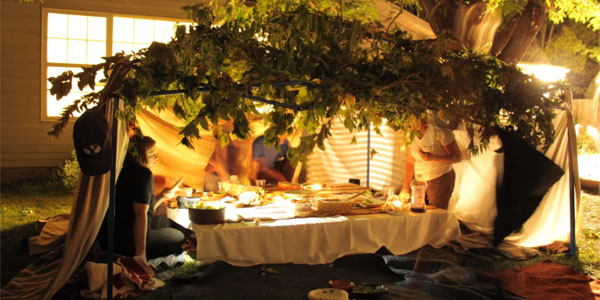Leviticus 23:26-44 Click here for Bible Verses

Hi GAMErs,
Today’s passage is Leviticus 23:26-44. Let’s go!
Leviticus 23:26-32 (NIV)
26 The LORD said to Moses,
27 “The tenth day of this seventh month is the Day of Atonement. Hold a sacred assembly and deny yourselves, and present an offering made to the LORD by fire.
28 Do no work on that day, because it is the Day of Atonement, when atonement is made for you before the LORD your God.
29 Anyone who does not deny himself on that day must be cut off from his people.
30 I will destroy from among his people anyone who does any work on that day.
31 You shall do no work at all. This is to be a lasting ordinance for the generations to come, wherever you live.
32 It is a sabbath of rest for you, and you must deny yourselves. From the evening of the ninth day of the month until the following evening you are to observe your sabbath.”
On verses 26-32: Verses 26-32 describe the Day of Atonement, a day when the people remembered how God atoned for their sins so that they could be forgiven. Why was God so strict about people not doing any work on the Day of Atonement? In part it was to emphasize that we cannot work for and earn our atonement. Rather, our atonement was and is God’s work, something He does on our behalf so that we could receive it freely. “For it is by grace you have been saved, through faith–and this not from yourselves, it is the gift of God– not by works, so that no one can boast.” (Ephesians 2:8-9).
Leviticus 23:33-44 (NIV)
33 The LORD said to Moses,
34 “Say to the Israelites: ‘On the fifteenth day of the seventh month the LORD’s Feast of Tabernacles begins, and it lasts for seven days.
35 The first day is a sacred assembly; do no regular work.
36 For seven days present offerings made to the LORD by fire, and on the eighth day hold a sacred assembly and present an offering made to the LORD by fire. It is the closing assembly; do no regular work.
37 (“‘These are the LORD’s appointed feasts, which you are to proclaim as sacred assemblies for bringing offerings made to the LORD by fire–the burnt offerings and grain offerings, sacrifices and drink offerings required for each day.
38 These offerings are in addition to those for the LORD’s Sabbaths and in addition to your gifts and whatever you have vowed and all the freewill offerings you give to the LORD.)
39 “‘So beginning with the fifteenth day of the seventh month, after you have gathered the crops of the land, celebrate the festival to the LORD for seven days; the first day is a day of rest, and the eighth day also is a day of rest.
40 On the first day you are to take choice fruit from the trees, and palm fronds, leafy branches and poplars, and rejoice before the LORD your God for seven days.
41 Celebrate this as a festival to the LORD for seven days each year. This is to be a lasting ordinance for the generations to come; celebrate it in the seventh month.
42 Live in booths for seven days: All native-born Israelites are to live in booths
43 so your descendants will know that I had the Israelites live in booths when I brought them out of Egypt. I am the LORD your God.'”
44 So Moses announced to the Israelites the appointed feasts of the LORD.
On verses 33-44: The biggest party of the Jewish calendar year was called the Feast of Tabernacles, a 7 day celebration described in Leviticus 23:34-44. It was so big and popular people just called it the “Feast” (e.g. John 7:37). People were to celebrate this festival by moving out of their normal homes and going camping in tents decorated with tree branches (Lev 23:40, 42-43).
God instituted the Feast of Tabernacles as a way for the Jews to celebrate the entire year of harvest (Lev 23:39), to commemorate how their ancestors had wandered in the wilderness in tents (Lev 23:43) and to simply be refreshed and have fun (“rejoice before the Lord your God for seven days”) (Lev 23:40).
Later on the Jews added other traditions to the Feast. For example, during the Feast the Jews would draw water from the Pool of Siloam in Jerusalem and pour it on the altar. It was their way of remembering how God drew water from a rock to quench His people’s thirst when they were wandering in the desert (Numbers 20). With that in mind, we can appreciate better why Jesus, on the last day of the Feast, stood up and shouted, “If anyone is thirsty, let him come to me and drink…and streams of living water will flow from within him.” (John 7:37-39)
From the Feast of Tabernacles, we can learn three important lessons:
1. God wants us to take time each year to rest, get refreshed and celebrate by doing something we don’t normally do. Vacation is a godly thing! Joy is a God thing!
2. God wants us to remember and appreciate the experiences of our ancestors. Don’t forget where you came from and the sacrifices that your ancestors made to make your life today possible.
3. Only Jesus is the true living water, and only in Him do we find lasting satisfaction and true refreshing. Whoever drinks the water Jesus gives will never thirst again (John 4:14).
Thank You Jesus for giving us reason to celebrate and be glad. Thank You for commanding Your people to celebrate and rejoice. It shows what a joyful, refreshing, fun and big hearted God you are, that You want us Your people to be refreshed and full of joy. In Jesus’ name, AMEN!

